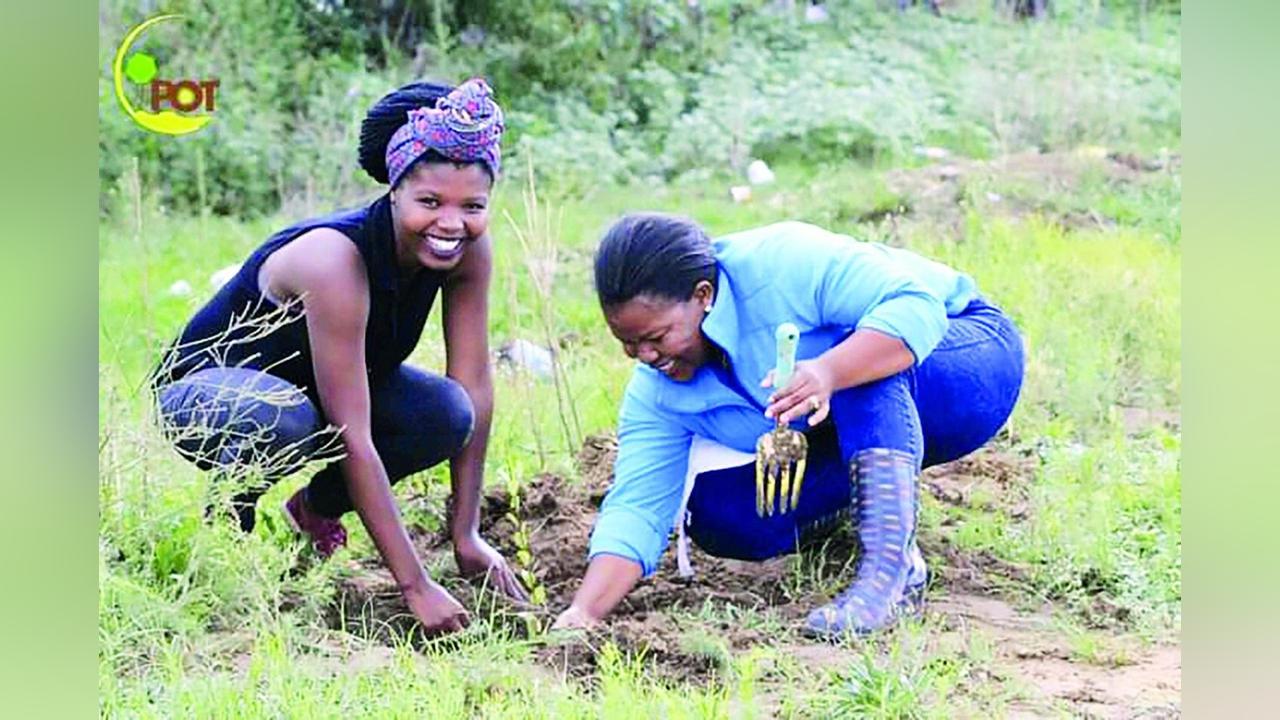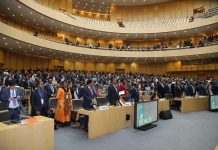Africa-Press – Lesotho. AS the impact of climate change becomes more pronounced, tree planting has been touted as a “natural climate solution” to capture and store planet-warming carbon dioxide emissions, while also conserving biodiversity and improving the quality of life for people.
Triggered by the alarming rate of youth unemployment, which currently stands at 32.8 percent, Mpho Lebesa, a 27-year-old from Ha-Abia has founded a youth-empowered environmental organisation called Plant One Tree (POT).
She founded the organisation after completing her studies at the National University of Lesotho (NUL). POT came as a plea or movement — Plant One Tree, Save One Planet!
“The mission is to rehabilitate and conserve the environment, restore the luscious greenery Lesotho once possessed by planting one tree at a go and saving our precious home, Earth, while producing food.
Essentially we will be creating jobs for Basotho youth,” said Lebesa. She said POT’s objectives are to plant forests, fruits and indigenous trees. Since it is youth-empowered, it operates in high schools and communities and has successfully planted over 400 trees to date in school orchards.
“I believe everyone, regardless of their status, has the responsibility to nurture the world we live in for future generations.
I believe human beings have to live harmoniously in this democratic global community because all lives are precious,” said Lebesa. She said POT came as a response to the high rate of depletion of the ozone layer and the general ecosystem.
“We discovered that common solution to the many socio-economic problems Lesotho is facing could be mitigated by planting a variety of trees.
The Development Studies and Political Science and Administrative Studies graduate said she was a subscribed member of a vibrant Public Administration and Political Science Association (PAPSA) club during her studies at NUL.
Members of the club were involved in gathering information from formal literature and current affairs and held debates and discussions on sensational and burning topics on local and international politics of climate change. The club, she said, was highly regarded by the faculty.
“My passion for sustainable and human development grew strong as I had a deep understanding of natural resource management, human resource development, management of public funds, public policy processes as well as international political economy courses offered at NUL.
“Knowledge and observations of the status of Lesotho in terms of managing natural resources and the unhealthy environment made it significantly critical that I established an organisation,” she said.
Lebesa attended online courses during the Covid-19 lockdown. She also studied subjects such as Achieving Sustainable Development from Trinity College Dublin, Making Climate Adaptation Happen from the University of Groningen, Human Rights-Based
Approach to Education from the Lesotho Council of Non-Governmental Organisations and Capacity Building for Women-led Enterprises by United Nations Development Program (UNDP).
“We have reached so many milestones despite the challenges we have faced since the establishment of POT in 2016,” she said.
Among the challenges was the lack of funding, Covid-19 movement restrictions, teachers’ strikes and political instability. She said the climate of Lesotho is characterised by the occurrence of extreme dry spells and wet spells.
“These climatic fluctuations have had a serious impact on the environment.
‘‘The impacts associated with dry spells include food shortages, famine, disease epidemics, invasion by exotic plants and destructive insects, dust bowls and the initiation of down cutting by rivers,” said Lebesa.
She said Lesotho is expected to experience a change in temperature and precipitation patterns, toward dryer and hotter conditions. In addition, the intensity and frequency of extreme events such as floods and drought are expected to increase, especially in the western and northern lowlands.
“The impacts of climate change in Lesotho will vary from sector to sector.
“Water resources will be affected negatively by the reduction of precipitation and increase in temperature.
“This will result in an increase in evaporation loss and a decrease in runoff and groundwater recharge.
Added Lebesa: “Rangeland conditions may deteriorate — and ultimately be destroyed — by changes in climate, leading to a change in the quality of livestock and livestock products.
“The present indigenous forests may change into semi-arid types while agricultural production will decline, resulting in food shortage.
” She said the ultimate solution to all of the afore-mentioned challenges has always been tree-planting.
Her organisation hopes to establish 100 000 POT clubs and farms with five various fruit orchards in both schools and communities by the year 2050. These clubs will have seed libraries that will offer seeds, seedlings, and technical support.
“These farms will be commercialised and will sell processed fruit jams, juice, dried and many other tree products.
” However, she said potential challenges include financial constraints and lack of political will to support such youth oriented initiatives.
“We therefore invite every individual, organisation and development partner to partake in this journey of the Lesotho we want.
“We have successfully worked with local as well as international stakeholders.
” She said they hope to plant more than one million trees before 2050.
She talked of a plan to plant trees in collaboration with the Tšepo Christian High School POT club to commemorate the 16 Days of Activism against Gender-Based Violence (GBV).
“This school has been in the headlines due to its students’ leaked sex tape, so as POT, we thought we could give them something positive to divert their focus and energy to tree planting,” said Lebesa.
“My siblings and I always believed that we were a team made of different individuals, gifts, talents, dreams, and interests and gracefully blended with love.
“We were raised to love, respect, protect and support one another and to love our home, country, continent and the whole world,” said Lebesa, adding that she grew up in a family of six children and “supportive” parents.
She said the value of education and humanity “were strongly instilled in me” from a young age. “I learnt to look at myself as a contributor of change in all those lenses of life.
“We were taught to believe that there was something greater than us that lives in us, God.
“Therefore, I have always searched for opportunities to embrace and uphold those values in every organisation I have interacted with.
As a founding director of POT, she said she made fruitful relations with other youth leaders she met when POT joined the regional mother-body of youth-led organisations called Southern African
Alliance on Youth Employment (SAAYE) in 2018. Later that year, she was selected to represent the youths in the preparation of the National Youth Conference on Reforms.
She then became a Youth Delegate in all multi-stakeholders forums and in-district consultations as an observer from civil society organisations in structural national reforms looking more into media, economic, security, judicial and constitutional, political and parliamentary arrangements thematic areas.
In her quest for self-development as a youth leader, she is a learner and a volunteer at the Development for Peace Education (DPE). Lebesa has worked as a liaison between the 24 high schools, institutions of higher learning, the National Manpower Development Secretariat management (NMDS) and the Minister of Education in times of disputes.
The model also incorporates a programme called Food Sovereignty, which is a collaboration with POT to promote food and orchards production. After her completion of Civic Leadership from the Young African Leadership Initiative (YALI), she said POT was “privileged” to be one of the Lesotho Delegates at the 4th YouthConnekt Africa Summit in Rwanda, 2019.
She said planting trees is cheap “at least compared to high tech sucking carbon technology whose efficiency isn’t proven yet”. “It’s available and it’s something citizens can easily get involved in.
By betting on planting trees while adapting the existing monoculture plantation, forests can become more inclusive and ecological. “This will help enrich wildlife and biodiversity while reducing water pollution, soil degradation, and plagues,” said Lebesa. She called on the youth “to change our environment, protect our biodiversity and nurture the beauty of our country.”
For More News And Analysis About Lesotho Follow Africa-Press






